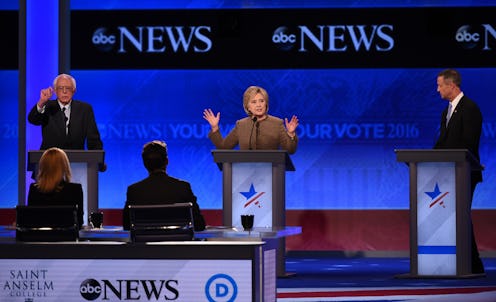Two years ago, The New York Times released a mini-doc about how a surge in heroin use had contributed to fatal overdoses in Maine. This is a crisis that has been spreading across New England — including to New Hampshire, where Saturday night's Democratic debate took place — as well as nationwide. As a result, the Democratic candidates were asked to address the national heroin crisis, which is remarkable considering that it is rarely discussed while marijuana legalization remains the mainstream topic of choice. But the fact that this question was posed indicates just how drastic the situation is, and just how much is left to be done. As one of the debate moderators pointed out, a recent poll indicated that 48 percent of New Hampshire's residents say they know someone affected by the heroin crisis.
Vermont Sen. Bernie Sanders was the first to respond to the question, and he mentioned that his own state was significantly affected by the crisis as well. Sanders has been advocating for the legalization and decriminalization of marijuana use for some time, and has demonstrated an understanding of the way in which the War on Drugs perpetuates systemic racism. But Sanders has also evidently given a great deal of thought to the heroin crisis, and in his response, he called for dramatic health care reform.
Well, for a start, this may seem like a radical idea, but I think we have got to tell the medical profession and doctors who are prescribing opiates and the pharmaceutical industry that they have got to start getting their act together, we cannot have this huge number of opiates out there throughout this country, where young people are taking them, getting hooked, and then going to heroin.
Sanders also slammed the health care system for forcing people to wait months at a time to get treatment for addiction, rather than having a variety of treatment options readily available for anyone who might need them. He explained that the root of the problem lies in how addiction is perceived.
We need to understand that addiction is a disease, not a criminal activity. And that means — and that means radically changing the way we deal with mental health and addiction issues.
Former Secretary of State Hillary Clinton, meanwhile, described her own engagement with the issue. She delivered a brief anecdote about a campaign trail visit to Keene, New Hampshire, where she was asked the very same question. Clinton was not as specific as Sanders in explaining the nature of the crisis, but she did talk about the need for more facilities to treat addiction, as well as for law enforcement to carry Naloxone, the antidote to opioid overdose.
Clinton went on to say that she has held town halls on this issue, and has laid out a five-point plan that would involve putting in $10 billion over 10 years to work with states on this crisis. While she evidently does have some concrete policy plans surrounding this issue, Clinton also used this as an opportunity to celebrate Boston Mayor Marty Walsh's willingness to publicly grapple with his alcoholism.
And I was proud to get the endorsement of Mayor Walsh of Boston, who has made his struggle with alcoholism a real clarion call for action in this arena.
Former Maryland Gov. Martin O'Malley was the last to respond to the question, and he had a personal experience to share.
I actually know a great deal about this issue. And I have a dear friend, played music with him for years, remember when his — when he came home with his baby girl, and now she's no longer with us, because of addiction and overdose. The last time in New Hampshire, I had to take a break shortly after landing and call home and comfort a friend whose mother had died of an overdose.
O'Malley described the heroin crisis as a public health challenge, and he said that during his term, he expanded drug treatment funding in Maryland — something he said he would do nationwide as president. His plan calls for a $12 billion federal investment in local partnerships that could intervene to prevent deaths from overdose. To make the point crystal clear, O'Malley posed a critical question:
What would we do if this were Ebola? How would we act?
Sanders was the only candidate of the three that did not propose a specific federal investment during the debate, but his approach also differs from those of the other two. While O'Malley and Clinton called for more facilities, programs, and funding, Sanders went one step further — at least in rhetoric — to slam the criminalization of addiction and call for easier access to mental health resources. O'Malley talked about intervention, while Sanders talked about the system itself; this is an important distinction to make between the two.
In New England and nationally, the heroin crisis has been rapidly getting worse. As the election season continues, it will be vital for the candidates from both parties to not only think about this issue, but also to meet with those who are affected by heroin addiction and determine how they might best help meet their needs. To learn more about the heroin crisis in New England specifically, watch the video from The New York Times below.
